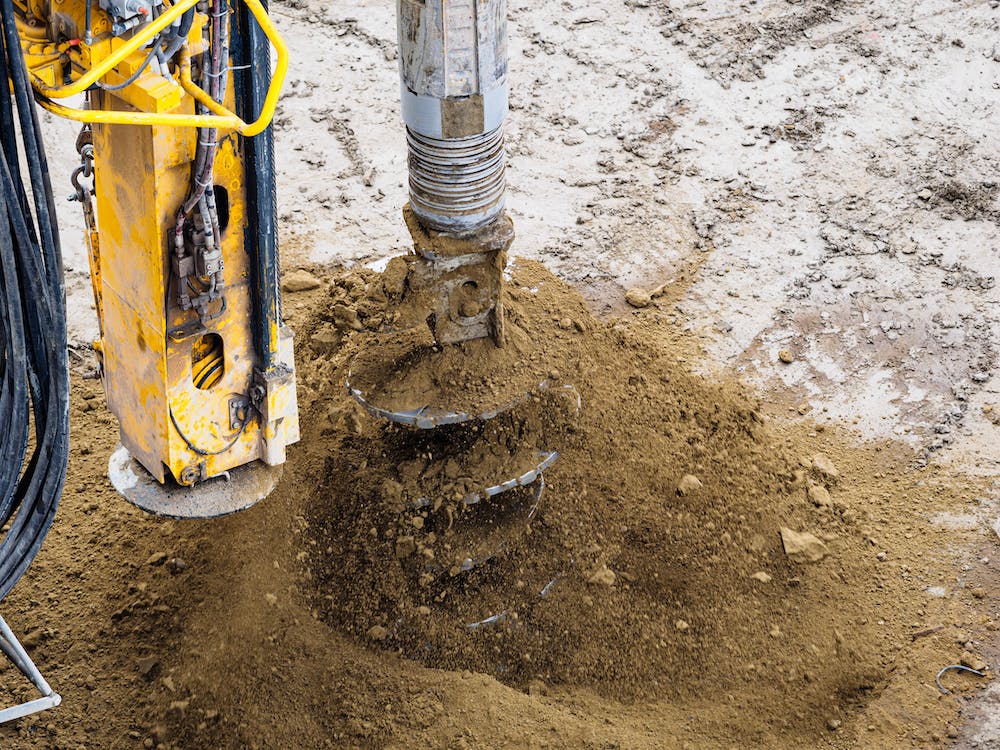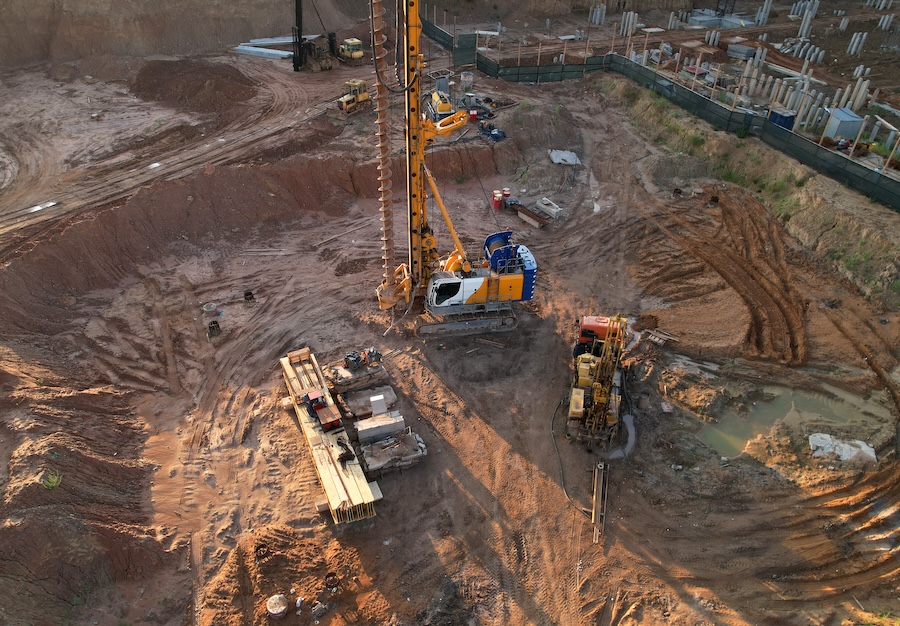A Comprehensive Overview: All About Geotechnical Engineering and Its Applications
A Comprehensive Overview: All About Geotechnical Engineering and Its Applications
Blog Article
The Significance of Geotechnical Engineering in Dealing With Environmental Challenges and Enhancing Construction Safety
Geotechnical design serves as a keystone in the intersection of ecological stewardship and building security, providing critical understandings into the habits of dirt and rock under various problems. By implementing critical site investigations and customized mitigation procedures, geotechnical designers play an important duty in safeguarding both human lives and environmental honesty.

Duty of Geotechnical Design
Geotechnical design plays an important function in the style and building of facilities by attending to the habits of soil and rock materials under various problems. This area of engineering is important for understanding the communication in between frameworks and the ground, which includes determining the load-bearing capacity of dirt, examining security, and predicting potential negotiation or failure.
Geotechnical engineers are accountable for carrying out site examinations, which include sampling and screening soil and rock to gather information on their chemical and physical homes. This information is important for developing foundations, preserving walls, and various other earth-retaining structures that ensure security and longevity. Geotechnical design notifies the option of suitable building and construction methods and materials, therefore reducing threats associated with soil actions.
Moreover, the combination of geotechnical design principles right into metropolitan preparation and environmental monitoring is essential for attending to challenges such as ground contamination and groundwater management. By recognizing geotechnical elements, designers can create sustainable services that improve the strength of infrastructure against natural dangers, while additionally promoting environmental stewardship. Eventually, the function of geotechnical design is indispensable for accomplishing risk-free, long lasting, and eco conscious construction methods.
Dirt Disintegration Reduction
Dirt disintegration poses a considerable danger to both ecological stability and facilities stability, influencing about 24 billion loads of productive dirt shed yearly worldwide. This sensation is aggravated by elements such as deforestation, urbanization, and inadequate agricultural methods. Geotechnical engineering plays an essential role in creating effective dirt erosion mitigation methods that protect both the setting and construction projects.
One technique requires the application of disintegration control methods such as vegetation planting, which maintains soil with origin systems. In addition, the building of retaining terraces and wall surfaces can efficiently decrease surface area drainage and secure susceptible areas from disintegration. Correct drain design is also crucial; it decreases water buildup and guides excess runoff far from vital structures.
In addition, geotechnical designers utilize soil stablizing methods, such as the application of geotextiles and naturally degradable mats, to boost soil cohesion and protect against deterioration - geotechnical engineer description. Normal tracking and evaluation of erosion-prone sites make it possible for timely interventions, making certain long-lasting sustainability. By incorporating these techniques, geotechnical design not only minimizes the effects of dirt erosion yet also adds to the resilience of facilities versus environmental obstacles, ultimately cultivating a safer and extra sustainable constructed environment
Groundwater Security Approaches
Groundwater works as an essential resource for alcohol consumption water, farming, and industrial processes, making its defense important for ecological sustainability and public health. Effective groundwater security approaches are vital in minimizing contamination risks and making sure the long life of this resource.

Regular surveillance of groundwater high quality is additionally necessary, enabling very early detection of contamination resources and helping with prompt remediation initiatives. Employing sophisticated technologies, such as geophysical studies and remote noticing, help in determining potential dangers Discover More Here to groundwater reserves.
In addition, public education and stakeholder involvement are important, fostering area support for groundwater defense initiatives. geotechnical specialist. By incorporating regulatory procedures, technical developments, and area involvement, we can produce a comprehensive framework that safeguards groundwater sources while advertising lasting development and building methods
Landslide Threat Management
Landslides position considerable dangers to both human safety and security and infrastructure, making efficient danger monitoring approaches vital. Geotechnical design plays a crucial role in determining, analyzing, and mitigating landslide threats. A comprehensive understanding of slope stability, dirt technicians, and hydrology is essential for creating effective risk administration strategies.
The initial step in landslide risk administration includes extensive website investigations, that include geological mapping and dirt screening. These investigations assist designers review the capacity for landslides by recognizing crucial variables such as slope angles, dirt make-up, and water content. Using advanced technologies such as remote noticing and geophysical studies can enhance the accuracy of these assessments.
When dangers are determined, proper mitigation measures can be carried out. These may include engineering solutions such as retaining wall surfaces, water drainage systems, and incline stablizing methods. Moreover, checking systems must be established to detect indicators of ground motion and changes in water degrees, permitting proactive treatments.

Enhancing Building Safety And Security
Construction sites commonly provide a myriad of dangers that can threaten employee security and job stability. Geotechnical engineering plays try this a crucial role in enhancing building and construction safety and security by giving necessary understandings into subsurface conditions. Via thorough dirt and rock analysis, geotechnical engineers can recognize prospective dangers, such as soil instability, groundwater concerns, and seismic susceptabilities, which may compromise the safety and security of building and construction activities.
Implementing geotechnical remedies, such as appropriate foundation layout and the usage of maintaining structures, mitigates these threats significantly. These remedies not only make certain the stability of the structures being constructed but additionally produce a safer working environment for construction personnel.
Furthermore, cultivating a culture of safety via training and adherence to established safety methods additionally improves construction site security. By incorporating geotechnical experience into the planning and implementation stages, construction projects can achieve higher safety standards, ultimately safeguarding workers and ensuring successful task conclusion.
Verdict
In verdict, geotechnical engineering offers as an important self-control in dealing with environmental obstacles and promoting construction safety and security. Via reliable soil disintegration mitigation, groundwater protection methods, and landslide risk monitoring, geotechnical engineers add to the advancement of resilient framework.
Geotechnical engineering serves as a keystone in the junction of environmental stewardship and building and construction safety, giving important insights into the actions of soil and rock under different problems. Geotechnical engineering notifies the option of appropriate building methods and materials, thereby lessening threats connected with dirt habits.
Geotechnical engineering plays a critical role in establishing effective dirt disintegration reduction approaches that safeguard both the environment and building jobs.
Additionally, geotechnical engineers use dirt stabilization website here methods, such as the application of geotextiles and eco-friendly floor coverings, to boost dirt communication and prevent degradation. Through extensive soil and rock analysis, geotechnical engineers can identify prospective dangers, such as soil instability, groundwater issues, and seismic vulnerabilities, which may compromise the safety of construction activities.
Report this page